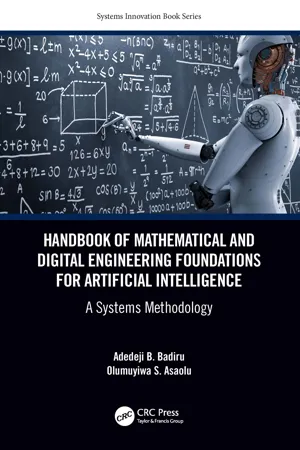
Handbook of Mathematical and Digital Engineering Foundations for Artificial Intelligence
A Systems Methodology
- 398 pages
- English
- ePUB (mobile friendly)
- Available on iOS & Android
Handbook of Mathematical and Digital Engineering Foundations for Artificial Intelligence
A Systems Methodology
About This Book
Artificial intelligence (AI) and digital engineering have become prevalent in business, industry, government, and academia. However, the workforce still has a lot to learn on how to leverage them. This handbook presents the preparatory and operational foundations for the efficacy, applicability, risk, and how to take advantage of these tools and techniques.
Handbook of Mathematical and Digital Engineering Foundations for Artificial Intelligence: A Systems Methodology provides a guide for using digital engineering platforms for advancing AI applications. The book discusses an interface of education and research in the pursuit of AI developments and highlights the facilitation of advanced education through AI and digital engineering systems. It presents an integration of soft and hard skills in developing and using AI and offers a rigorous systems approach to understanding and using AI.
This handbook will be the go-to resource for practitioners and students on applying systems methodology to the body of knowledge of understanding, embracing, and using digital engineering tools and techniques.
The recent developments and emergence of Chatbots (AI tools) all have mathematical foundations for their efficacy. Such AI tools include ChatGPT, GPT-4, Bard, Tidio Support Bot, Kuki AI Companion, Meena, BlenderBot, Rose AI Chatbot, Replika: AI Friend, Eviebot, and Tay. This handbook highlights the importance of mathematical and digital foundations for AI developments. The handbook will enhance the understanding and appreciation of readers about the prevailing wave of artificial intelligence products, and, thereby, fitting the current market needs.
Frequently asked questions
Information
Table of contents
- Cover Page
- Half Title page
- Series Page
- Title Page
- Copyright Page
- Dedication
- Contents
- Preface
- Acknowledgments
- Authors
- 1 Artificial Intelligence within Industrial and Systems Engineering Framework
- 2 Mathematics of Cantor Set for AI Searches
- 3 Set-theoretic Systems for AI Applications
- 4 AI Mathematical Modeling for Product Design
- 5 Mathematical Formulation of the Pursuit Problem for AI Gaming
- 6 AI Framework for the Financial Sector
- 7 AI Neuro-Fuzzy Model for Healthcare Prediction
- 8 Stochasticity in AI Mathematical Modeling
- 9 Mathematical Utility Modeling for AI Application
- 10 Artificial Intelligence and Human Factors Integration in Additive Manufacturing
- 11 AI Systems Optimization Techniques
- 12 Mathematical Modeling and Control of Resource Constraints
- Appendix A: Mathematical Expressions and Collections (Series, Patterns, and Formulae)
- Appendix B Cantor Set Sectioning